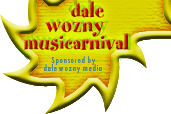find it fascinating that recorded music is really just over 100 years
old. Thomas Edison and his little invention, the gramophone, started the whole thing. Prior to that time, if you wanted
to hear music, you had to have a musician. What a novel concept! I was
not alive at the time of Thomas Edison's invention (I'm 37), but I'll
bet every musician alive then had the notion that recorded music will
put musicians out of work. The same thing was said about the synthesizer.
And to a certain extent, that has been true. However, it has given us
all so much in return and I believe we will adapt and be all the better
off for it's existence. Anyway, there's no way to stop progress, so you
might as well get one.
But back to the ramifications of recorded music. I have some interesting
theories on this. When I first began to write music with any frequency,
(about 22 years ago), I discovered through my noodlings with two stereo
reel-to-reel Sony tape decks very early on that anything works. Whatever
note or chord or drum beat or rhythm or noise you wanted to play was
OK. Actually, it became OK. What I mean is this: By simply recording
something and playing it back several times, the listener can become
accustomed to that sound or group of sounds. After a few listenings,
it begins to define it's own form, it's own sense of being, it's own
"correctness". It takes on a life of it's own. This became
completely evident to me after coming to know a work by the late composer
John Cage joined by David Tudor in a work titled "Indeterminacy".
The theme behind this 2 album set (obtained before CD's existed) being
random acts of audio.
John Cage would randomly prepare several stories of prose and/or poetry
to be read while David Tudor would improvise on prepared piano (a piano
into which was stuck between the strings any number of nuts, bolts,
sticks, keys, books etc. A tricky procedure as the force of a piano
string snapping is enough to kill a person). The reading of the stories
was further randomized by the fact that each story of varying length
would be read to fit into a randomly decided time frame. So if a short
story was randomly decided to be read in a randomly decided long time
frame, John Cage would read the story very slowly. If a long story was
randomly decided to be read within a short time frame, he would read
rapidly. All this going on while David Tudor is making crazy noises
with a wacky piano and throwing in randomly placed noise and recorded
sound effects such as a train wreck or what have you. Listening to this
at first was quite unsettling, though after repeated listenings, one
became "familiar" with the piece so much so that the randomly
placed backward junk yard noises began to sound appropriate and descriptive
over the story about the canary told very slowly. It all seemed to "work"
in terms of creative form. At that point I decided that I would remove
my compositional boundaries and let the flood gates open. This has allowed
me to compose literally anything that came to mind. I've come up with
some pretty wacky stuff based on that premise.
The implications of recorded music on composition are quite powerful.
Insofar as we can expect to hear the identical groupings of sound repeatedly
certainly have an effect on how that sound is perceived. For example:
consider a favorite CD of yours. Did you like it the first time you
heard it? Does it get better with each listen? Do you get sick of it
if you become too familiar with it? This must all be considered when
composing. Don't let it weigh you down though. The mere fact that you've
read this brings it into consideration. Now, let your subconscious mind
do the rest.
We take for granted the fact that we can hear the IDENTICALLY performed
piece of music over and over again. Up until 100 years ago, that was
impossible. The purpose of my relating the John Cage Indeterminacy story
is enlighten you to the implications of music that has been recorded
and can be listened to repeatedly. This will help you break down your
walls and build bridges to your creative inclinations. After composing
something of that nature, one gets a totally exhilarating feeling at
having stretched one's imagination to the brink. It makes coming back
down to compositional earth quite refreshing and actually brings new
meaning to even the simplest melody. Later on we'll discuss at length
a method to compose such a seemingly random piece of music.
NEXT CHAPTER >>>


